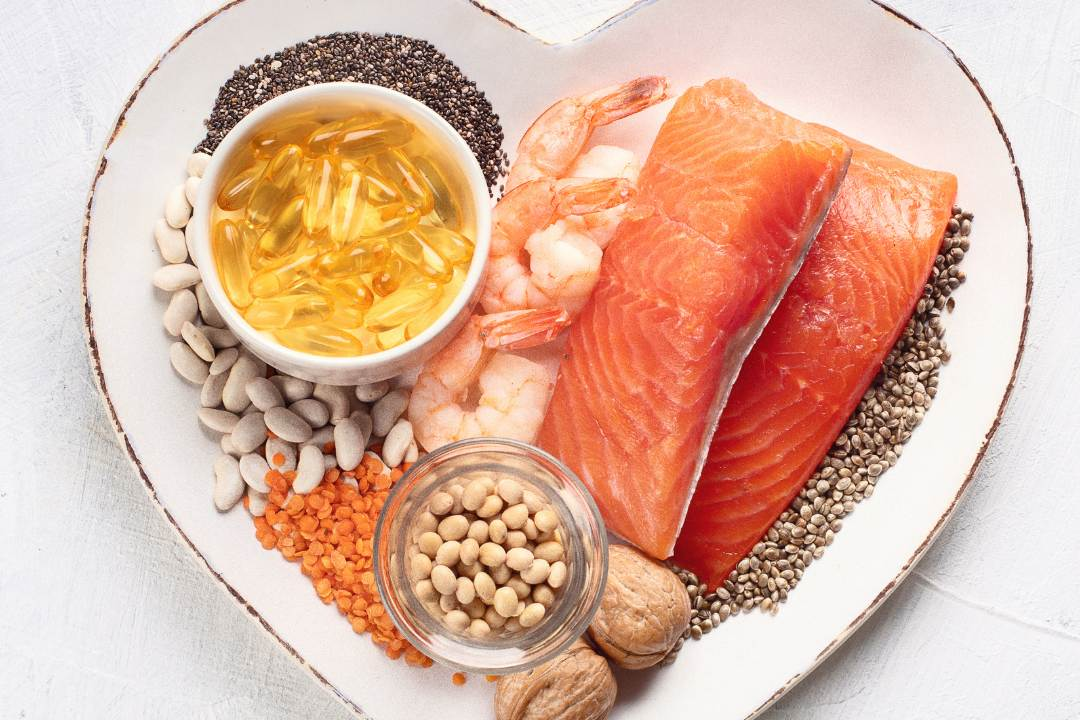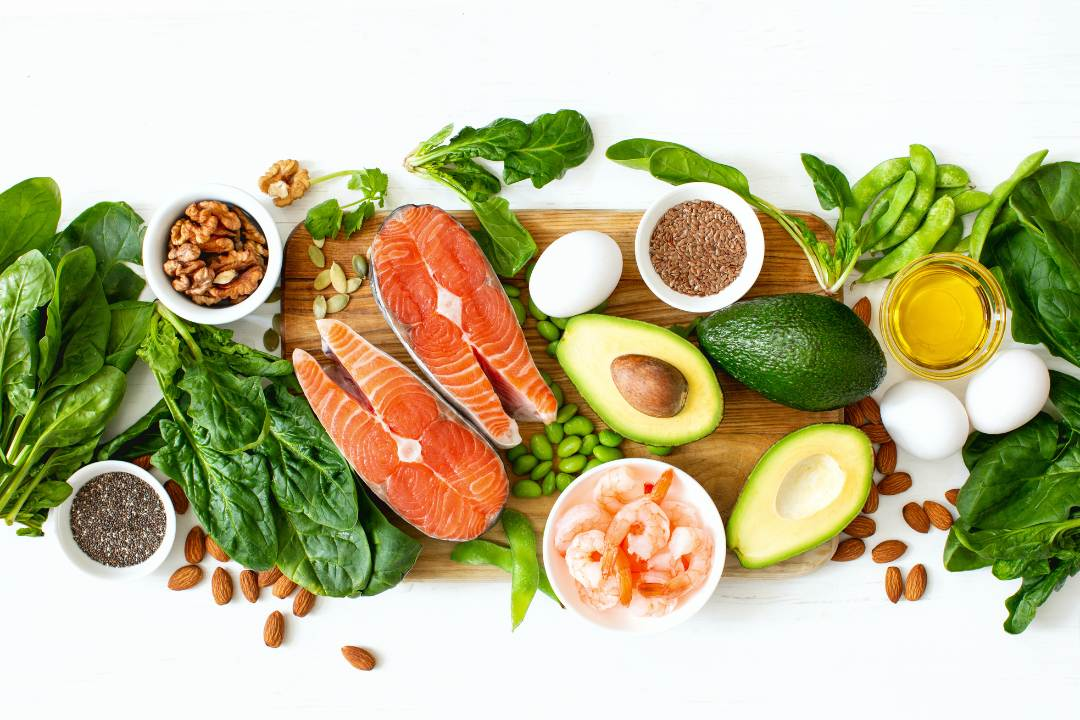
Omega-3 Fatty Acids: A Key to Healthy Living
Share
In our quest to live healthier and smarter, we often encounter an alphabet soup of essential nutrients - vitamins A to Z, minerals, antioxidants, and more. But if there's one that you should certainly be familiar with, it's omega-3 fatty acids.
But why is this nutrient a superstar? And how can you harness its power in your own life? Whether you're a health aficionado or a newcomer to nutrition, our comprehensive guide to omega-3 fatty acids will shed light on these important fats. We'll delve into their health benefits, natural food sources, and the ins and outs of omega-3 supplements.
Omega-3 fatty acids have long been recognised for their heart-healthy benefits, but did you know they're also crucial for optimal brain function? Furthermore, they can promote healthy eyes, joints, and more. But what exactly are these magic molecules, and how can you incorporate them into your diet? Let's explore.

What are Omega-3 Fatty Acids?
Omega-3 fatty acids belong to a group of polyunsaturated fats that are not just a crucial part of the human diet but absolutely essential for optimal health. Your body is an incredible machine but can't produce these beneficial fats alone. This means we must obtain them from the foods we eat or supplements we take; hence they are referred to as 'essential fatty acids'.
These fats play an instrumental role in a multitude of biological functions. They maintain the fluidity and function of cell membranes throughout the body, provide a foundation for creating hormones that regulate blood clotting and inflammation in cardiovascular disease, and crucially support brain function, growth, and development.
They are also known for their potential to mitigate chronic diseases, like heart disease and arthritis, by reducing inflammation.

Types of Omega-3 Fatty Acids
Broadly, three primary types of omega-3 fatty acids are biologically important to us: ALA (alpha-linolenic acid), DHA (docosahexaenoic acid), and EPA (eicosapentaenoic acid).
ALA (Alpha-Linolenic Acid)
ALA is considered a short-chain omega-3 fatty acid. This means it has a shorter chemical structure than the other two types. ALA is commonly found in various plant-based foods, such as flaxseeds, chia seeds, hemp seeds, walnuts, and leafy greens. While ALA doesn't have many physiological roles, it is converted in the body, albeit not very efficiently, to the longer-chain EPA and DHA, which have numerous health benefits.
DHA (Docosahexaenoic Acid)
DHA is a long-chain omega-3 fatty acid. It plays a vital role in the development of the brain and retina during the early years of life, and its adequacy is critical for maintaining normal brain function throughout life. DHA is primarily found in fatty fish and algae, making it quite tricky for vegetarians and vegans to obtain from their diet.
EPA (Eicosapentaenoic Acid)
EPA is another long-chain omega-3 fatty acid primarily found in fatty fish, fish oils, and algae. It has a range of functions in the body. From a health perspective, EPA is often celebrated for its anti-inflammatory effects. This anti-inflammatory property can help manage conditions like heart disease and arthritis.
To benefit from all these different types of omega-3 fatty acids, it's important to have a balanced and varied diet that includes whole plant foods and animal sources. In some cases, supplements might be a valuable addition.

Sources of Omega-3 Fatty Acids
As mentioned earlier, the human body cannot produce omega-3 fatty acids, so they must be sourced from the foods in our diet. Both animal and plant-based foods can be excellent sources of these essential fats.
Animal-Based Sources
Fish and Seafood
Fish and other seafood are among the richest sources of long-chain omega-3 fatty acids, specifically EPA and DHA. Fatty fish like salmon, mackerel, tuna, herring, and sardines are exceptionally high in these fats. For example, a 100-gram portion of wild salmon can contain up to 2.6 grams of omega-3, depending on the species. If you are a seafood fan, consider adding oysters and shrimp to your diet, as they contain higher doses of omega-3.
Fish Oil
Fish oil is one of the most commonly used dietary supplements and a potent source of omega-3 fatty acids. It is derived from the tissues of oily fish and is often recommended for people who lack fish in their diet.
Eggs
Some eggs, often labelled as omega-3 enriched or pastured, also contain considerable amounts of omega-3. These eggs are laid by hens fed flaxseed or fish oil, among other nutrients resulting in an increased omega-3 content.

Plant-Based Sources
Plant-based sources primarily provide ALA, which our bodies can convert into EPA and DHA, albeit at a lower efficiency.
Chia Seeds
Chia seeds are an excellent source of ALA omega-3 fatty acids packed with dietary fibre. Just one ounce of chia seeds provides a whopping 5 grams of omega-3.
Flaxseeds and Flaxseed Oil
Flaxseeds, and their derivative flaxseed oil, are among the best plant-based sources of omega 3s and ALA. One tablespoon of flaxseeds contains about 1.8 grams of omega-3.
Walnuts
Walnuts not only taste great but are also high in omega-3. A single serving of walnuts (about a handful or 30 grams) can provide 2.5 grams of ALA.
Hemp Seeds
Hemp seeds contain a good amount of ALA and are also considered a healthy eating complete protein source, making them an excellent choice for vegetarians and vegans.
Algal Oil
Algal oil is a unique plant-based source of omega-3 that contains both EPA and DHA. It is derived from algae oil, the food fish consume that makes them high in omega-3s.
It's worth noting that while plant-based omega-3 sources are healthy and beneficial, they contain the shorter-chain ALA. The conversion rate of ALA to the more beneficial long-chain omega-3s (EPA and DHA) is relatively low in humans. Therefore, if you are a vegetarian or vegan diet or don't eat much fish, you may want to consider an algae-based omega-3 supplement.

Omega-3 Supplements
While a balanced diet rich in omega-3 sources eating fish is ideal, many people may struggle to achieve sufficient omega-3 intake from food alone. This is particularly true for those who follow plant-based diets or don't consume much fish. In these instances, omega-3 supplements can effectively ensure you're getting the necessary amount of these essential fats.
Omega-3 supplements include fish oil, krill and fish oil supplements, cod liver oil, and algal oil capsules. They primarily provide EPA and DHA, the omega-3 types most readily used by our bodies.
Pros of Omega-3 Supplements
-
Convenience: Omega-3 supplements provide an easy way to boost your intake, especially if you don't regularly eat fish.
-
High in EPA and DHA: These supplements are rich in EPA and DHA, the forms of omega-3 most readily used by the body.
-
Algal Options for Vegans/Vegetarians: Algal oil supplements are a plant-based source of both EPA and DHA, making them an excellent option for vegetarians and vegans.
Cons of Omega-3 Supplements
-
Not a Replacement for a Balanced Diet: While they can help increase your intake, supplements are not a substitute for a diet rich in omega-3 foods.
-
Possible Side Effects: Some people may experience side effects such as fishy aftertaste, bloating, or stomach discomfort.
-
Quality Varies: Not all omega-3 supplements are created equal. The quality can vary, and some may contain impurities.

Omega-3 Supplements Available at The Good Stuff
THE REAL THING Mega Omega Supreme
This high-strength supplement is a top-quality source of purified, concentrated fish oil. It's rich in omega-3s and designed to support heart, brain, and joint health.
PHYTOCEUTICS Purest Omega 3
Phytoceutics Purest Omega 3 prides itself on purity and sustainability. It delivers high levels of EPA and DHA, supporting cognitive function and cardiovascular health.
THE REAL THING Mega Omega Fish Oil
The Real Thing Mega Omega Fish Oil offers a blend of EPA and DHA from wild-caught, deep-sea fish oil. It supports brain health, cardiovascular function, and inflammation management.
NATROCEUTICS Omega 3 Pure & Wild
This supplement is sourced from wild-caught fish, providing a pure source of omega-3 fatty acids. It helps maintain a healthy heart, brain, and immune system.
NATROCEUTICS Omega 3 Fortified
Omega 3 Fortified is designed to boost omega-3s, fortified with vitamin E to offer additional antioxidant support.
THE REAL THING DHA
This supplement focuses on providing a generous dose of DHA, an omega-3 fatty acid essential for brain health and function.
CREDÉ Organic Flax Seed Oil
A plant-based option, Credé's Organic Flax Seed Oil is a great source of ALA, a type of omega-3 fatty acid. It's an excellent choice for vegetarians and vegans.
WILLOW Omega 3 Salmon Oil
Willow's Omega 3 Salmon Oil is sourced from wild salmon. It's packed with EPA and DHA and supports overall wellness, including heart and brain health.
GOODHEALTH Red Super Krill
Red Super Krill offers omega-3s sourced from Antarctic krill, which are believed to be absorbed more effectively by the body. The supplement also contains astaxanthin, a powerful antioxidant.
GOODHEALTH Omega 3 Fish Oil
GoodHealth's Omega 3 Fish Oil provides a balanced blend of EPA and DHA, supporting heart health, brain function, and joint mobility.
THE REAL THING Mega Omega 3+6+9
This comprehensive supplement balances omega-3, omega-6, and omega-9 fatty acids to support overall health and well-being.
METAGENICS OmegaGenics EPA-DHA 720
Metagenics offers a high-quality fish oil supplement with 720mg of EPA and DHA per serving. It's designed to support cardiovascular health and immune function.
FLORA FORCE Alvega-3
Alvega-3 is a plant-based omega-3 supplement derived from microalgae, offering a viable omega-3 solution for vegetarians and vegans.
A. VOGEL VegOmega-3
This is another plant-based omega-3 supplement. VegOmega-3 provides ALA sourced from flaxseed oil, suitable for those following a vegan or vegetarian diet.
Remember, while these supplements offer a convenient way to boost omega-3 intake, they should be part of a balanced diet. Always consult with a healthcare provider before starting a new supplement regimen. They can provide personalised advice based on your individual health needs and lifestyle.
Also, keep in mind that not all omega-3 supplements are created equal. Selecting a product that prioritises quality, transparency, and sustainability is important. Always look for third-party testing and sustainability certifications where possible. This ensures that the product you choose is effective and environmentally responsible.
Lastly, take note of your dietary preferences and needs. If you follow a vegetarian or vegan diet, consider plant-based omega-3 supplements like flaxseed or algal. And if you're allergic to certain fish or shellfish, steer clear of krill oil supplements.
In conclusion, omega-3 fatty acids are essential nutrients that have a wide range of health benefits. If you cannot get enough from your diet alone, supplements can effectively boost your omega-3 intake. Just remember to make them part of a balanced diet and healthy lifestyle.
